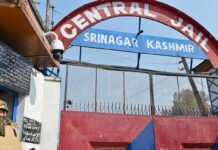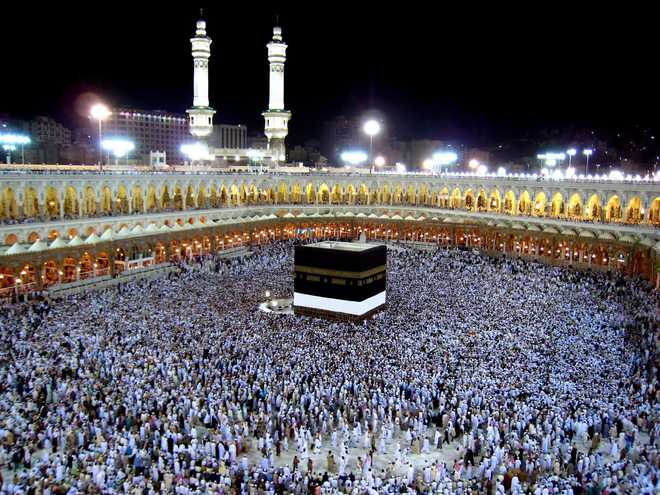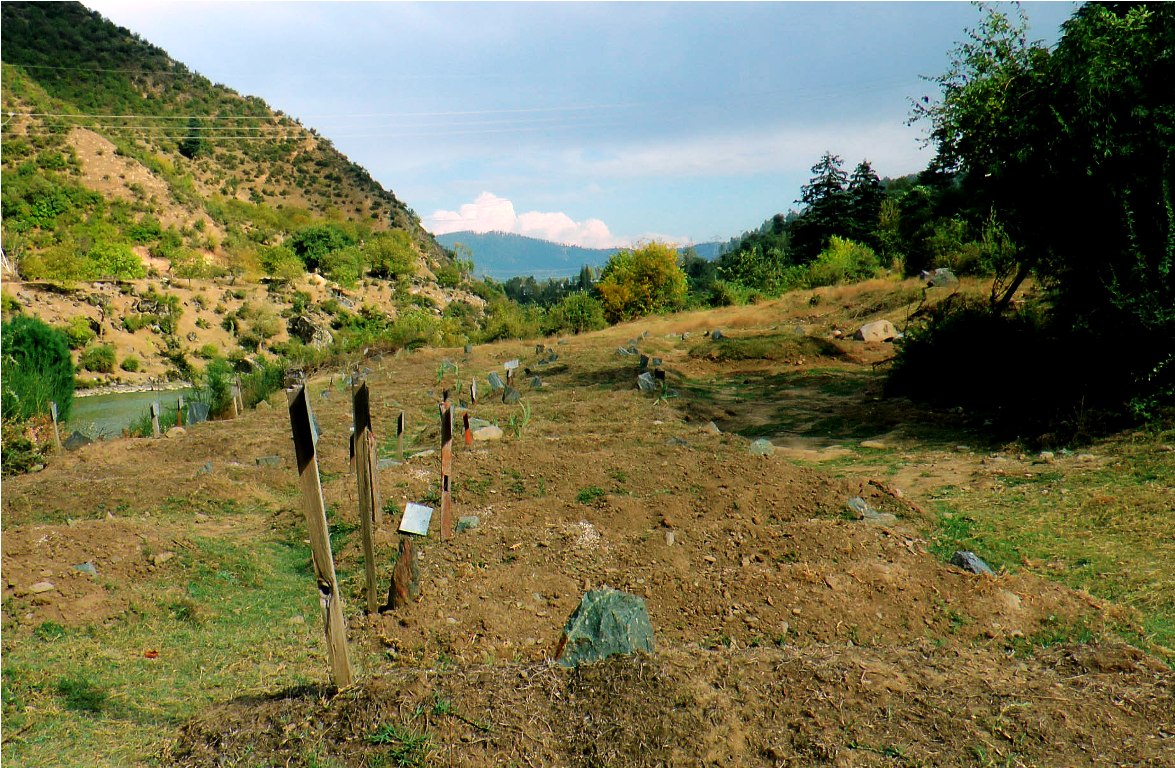
Dressed in black pheran and white skull cap, Mohammad Maqbool Malik, 60, sits on the window of his living room in Mohamadpora village in Kulgam. His wrinkly forehead puckers and eyes get moist as he stares at his ancestral graveyard, located at a short distance from his home.
“Only if my son would have been buried in this graveyard, I could visit him multiple times a day,” Malik said, as he gulped back his tears.
On the afternoon of June 4, 2020, Malik’s son, Hilal Ahmad, 24,, was busy in loading his truck with peas and cherries, that were to be transported outside Kashmir. The same day Ahmad had promised his grandmother to accompany her to a doctor, and to do so he travelled to a neighbouring village to borrow a car from his uncle.
At around 3:30 pm Malik heard that militants in a vehicle had fired at a police party in main market Yaripora. Three hours passed and Ahmad didn’t return. The family then became anxious and tried to call him, but couldn’t contact. An hour later, forces descended on Malik’s house and searched every corner of his house.
“I couldn’t understand what was going on. They kept destroying everything that came in their way,” Malik said. “It was then that we came to know that the car in which the militants were travelling was driven by Hilal.”
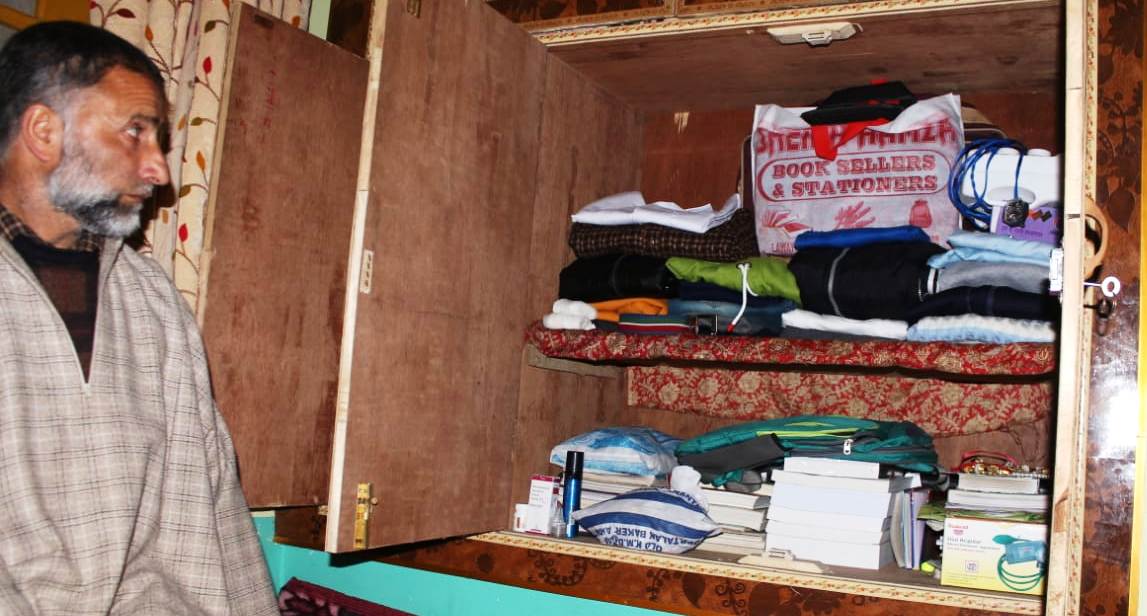
Malik believes that his son’s decision of joining militancy was not planned, as he was a responsible boy who worked hard to earn a livelihood for his family. “We came to know that on his way back home, two militants had asked him for a lift. And after the Yaripora incident, he knew that he would be arrested and questioned if the police caught him.”
For the next one month, Ahmad’s family was hopeful of his return, until an encounter broke out just at a distance of 1 km from their house. On July 5, Ahmad’s mother, Aisha Begum was performing ablution for Namaz, when she sensed the uneasiness in the air.
“People had started to gather outside our home but I didn’t know the reason, as I didn’t hear any gunshots,” Aisha said. Early that morning, Malik was called to Police Station Kulgam for identification of his son, and it was there that the news about his son being trapped in an encounter broke out. He quickly ran home. The couple then went to the encounter site and appealed their son to surrender, but he refused and asked his parents to return. After some minutes the firing stopped, and Ahmad along with a foreign militant was killed.
The following day, the whole of the family travelled to Police Control Room Srinagar, where his body was taken. Malik knew that his son will never come back now, so he embraced him as much as he could.
“I kissed him, hugged him and even applied medicine to his wounds. They allowed all of us to see him,” he said. “We pleaded them to give us the body, but they didn’t, citing the reasons for the pandemic.”
Under the new system initiated during the pandemic, authorities are quietly burying the bodies of local militants at faraway places in unmarked graves to avoid, what is stated, the gathering of people for funerals.
This is for the first time in the three-decade-old conflict in Kashmir that bodies of local militants are not handed over to their families for the last rites. Out of all the militants killed during the pandemic, Ahmad and his associate were the only two to be declared Covid-19 positive, and as per the changed protocol, Ahmad’s body was not handed over to his family, rather discreetly buried at a graveyard in Sheeri Baramulla.
“If he had the virus, I too should have contacted it, but I didn’t. Bodies of the people who died because of the virus were given to their families and buried in their native graveyards, but the new rule was made only for our sons,” Malik trails off.
Since then, the family has been able to visit the mass graveyard only once. A labourer by profession, Malik cannot afford to visit his son, buried nearly 140 km away from his native village, frequently. “It costs us a lot to make a visit to the graveyard,” Malik said.
The truck that Ahmad used to drive, along with the car used in the militant attack and a scooter were seized by the police. “The truck was our main source of income. We have a pending loan of the vehicle with the bank and it has become the NPA now,” the dejected Malik said.
Seven months have passed since Ahmad was killed and his grandmother, 80-year-old Khadija still sits on the porch of her house, fixing her sunken eyes on the main gate. The family members said that Ahmad shared a very strong bond with her.
“This is the gate he walked out and never returned, neither alive nor dead. He promised to take me to a doctor, but he couldn’t fulfil it,” Khadija said.
Khadija’s husband passed away years ago and she wished her grandson to be buried beside him. “The authorities have left an open wound in our hearts. There are three graveyards surrounding our home and he wasn’t laid to rest in any of them.”
Unaware of where his grandson is buried, Khadija said in a hushed tone: “Dapaan kunhaet chus number (I heard his grave is numbered as 59).
Another militant buried in the same graveyard in Baramulla is Aadil Ahmad Bhat of Charsoo-Batpora village in Awantipora. An Unani Medicine and Surgery (BUMS) student at Tibiya College in Sumbal, Aadil left his home on August 18, 2020, for Zuhar prayers and didn’t return. Hours later, Altaf Ahmad, Aadil’s elder brother, roamed around the villages, enquiring about his brother.
As nobody knew about his whereabouts, Altaf suspected the worst. Once back home he immediately went to Aadil’s room and sensed the unsaid. “His books, that usually used to remain open, were neatly arranged on the almirah and his phone was broken. He had also left his identity and debit card in the room,” Altaf recalled. Following day, the family filed a missing report at Awantipora police station.
Rumours about their son picking up arms spread like wildfire in the village and the speculations were proved right three days later when a purported audio clip of Aadil surfaced on social media. Aadil had announced his joining of militant ranks and urged his family not to search for him. “Since then whenever any encounter started in the valley, we used to follow the news. Our hearts raced every time we heard of any such event,” Altaf said, as his voice cracked.
Days after becoming a militant, Aadil secured a distinction with 80 per cent marks in his third semester of BUMS, the result of which was declared on August 25. “He was a brilliant student and had secured 94 per cent marks in class 10 examination. In class 12th, he secured 90 per cent marks,” Altaf said.
The worst fear of this Awantipora family came true with a pre-dawn encounter at Firdousabad locality of Batamaloo Srinagar on September 17. The gunfight ended with the death of Aadil, along with two of his militant associates, Zakir Paul of Aloora Shopian, Ubair Mushtaq of Badragund Shopian and a local baker woman, Kousar Reyaz.
Altaf said that they came to know about Aadil’s killing on the internet. Aware that the body of militants is not handed over to families, they soon rushed to Police Control Room Srinagar to bid a farewell to their loved one.
“The authorities tried every possible way to make us return back. Nearly 30 vehicles were following them and the cars with numbers belonging to Kulgam, Pulwama and Shopian were barred from moving forward,” Abdul Rashid Bhat, father of Aadil said. “But after a lot of struggle, we reached Sheeri Baramulla and only the close relations were able to see them and attend their funeral.”
An eerie silence prevails in the double-storeyed well-built house of Abdul Rashid. A high-ceilinged room on the first floor belonged to Aadil. After his killing, “his sister doesn’t allow anyone to enter this room,” Altaf said. Not a single thing has been moved and his ironed clothes and books are kept in a locked cupboard. Unlike Ahmad’s family, Aadil’s has been able to visit the graveyard multiple times in the past three months.
“Why would the virus spread only through our sons, and not by the hundreds of other deaths that have happened. Earlier this month, a policeman was killed and his funeral was attended by high ranking officials also, besides everyone else,” Rashid said.
Abdul Rashid believes that the lockdown is just an excuse of the authorities to not let the families have the bodies. “I wonder what harm would a dead body bring to them. By not handing over the bodies they have just added to our already existing pain,” he said. “Earlier we used to yearn for their return, now we are yearning for their remains”.

Distinctive from the other graves marked with numbers in Sheeri area of the border town Uri, is a grave with a name stone. It belongs to 14-year-old Hazim Shafi Bhat of Khirpora in Handwara. Hazim, a physically challenged boy was killed during an encounter in Wangam village on the Baramulla-Handwara road, on May 4, 2020.
Hazim, along with a group of boys, was grazing cattle in his orchard, around 100 meters from the spot of the encounter when they heard gunshots. While the other boys managed to escape from the area, taking the main road, Hazim tried to run from the other side.
“But since he couldn’t walk properly he was stranded near an irrigation canal and was hit by a bullet there,” said Feroz Ahmad, Hazim’s cousin brother.
“We assured them that only a small number of relatives and family members would be present. But they didn’t listen to us,” Feroz said. “They then convinced us by saying that our son shouldn’t be a cause for the spread of the virus to a number of households.”
Nearly, 20 people were allowed to participate in his funeral at Baramula. Hazim’s mother, 35-year-old Naema Begum, was among those who travelled to the remote village in Sheeri to have the last glimpse of her son before he was lowered into the grave. Since then they have been visiting his grave every 15 days.
“He was not a militant or a militant associate. Neither was he an unidentified person, so he shouldn’t have been treated like one,” the family repeatedly said.
At Barthana Qamarwari area of Srinagar, another mother Gulshan Farooq is getting ready for a 60 km long journey to her son’s grave in north Kashmir’s Handwara. On June 21, 2020, 19-year-old Shakoor Ahmad Langoo was killed in an encounter at Zoonimar, Srinagar. Exactly a year before, on a sunny day of June 2019, Shakoor, a tenth class student suddenly left his home. After failing to find him anywhere, his father Farooq Ahmad Langoo filed a missing report with the police.
For the following month, the couple moved from pillar to post to find their son, the search then ended with a call from the police. A picture of Shakoor brandishing a pistol was shown to his father.
The dawn of June 21, 2020, brought the most expected but woeful news to them. Shakoor, along with two other militants was trapped in a residential house at Zoonimar. Farooq, his wife and his elder brother reached the nearby police station.
“From there we were taken to encounter site,” he said. As the couple walked through the streets of Zoonimar, that were flooded with forces, their bodies shivered and hearts palpitated wildly. Soon, they took desperate turns to plead with their son to drop the weapon and surrender but there was no response. “We were crying and appealing him to return, but he had made up his mind,” Farooq said adding that for the following few hours, they were kept waiting inside the police station.
Back at Qamarwari, restrictions were placed at Farooq’s house, so he decided not to return. “Mourners were not allowed to visit us, and the people inside were not allowed to leave. If I would have returned home, I don’t think I could accompany my son for his last journey.”
The encounter ended with the killing of Farooq’s son and his two associates. The bodies of three young militants were retrieved and then taken to the PCR. With a wish to have a glimpse of their dead son, whom they had never seen in the past year, Shakoor’s parents also went to the control room. “We literally begged the officials to let us see our son, but they were deaf to our cries. They treated us like criminals,” Farooq said.
As part of the new protocol, they were taken to Rajpora Handwara for burial. Farooq decided to follow the vehicle. “Initially, they promised me that they will give back his body but later on I came to know that they are taking him to Handwara,” Farooq said. Luckily, in Handwara the family was able to see their son and participate in his funeral.
The family has since then visited the graveyard more than 15 times. “They think that by burying our sons far away, we would forget them. But I will keep visiting him till my last breath,” Gulshan Farooq said adding that everyday memories of his son flash before her eyes. “He was born on the day of Shab-i-qadr and was a calm and obedient child. I don’t know what changed his mind,” Gulshan said as she touched Shakoor’s uniform with her hands.
Visiting his son’s grave, Farooq added, gives him peace. ”But I wish I could bury him close to our home. He didn’t even return dead to us. And this will haunt me throughout my life now,” he said.
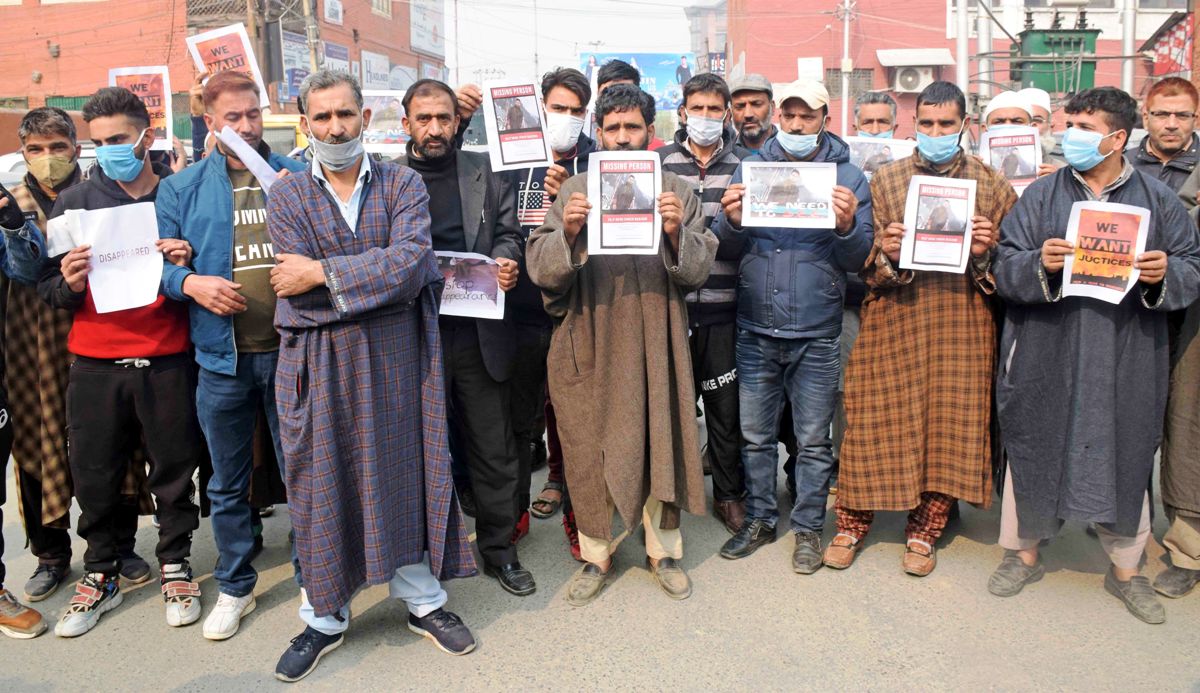
On August 3, 2020, suspected militants abducted an army man Shakir Manzoor, after they stopped his car while he was travelling through Damhal Hanjipora in Kulgam. His vehicle was also set afire. Reports said that Shakir’s blood-stained clothes were found in an orchard at Landoora (Shopian). In a purported audio message uploaded on social media, Manzoor Ahmed, father of the territorial army soldier said: “If my son is not with you, tell me. But if you have killed him please send me his body.”
A few days later, an undated and unverified audio surfaced on social media in which a person, suspected to be a militant, claimed to have killed the abducted soldier and not returned the body.
“We understand the pain of the soldier’s parents and his relatives. The body was not returned to his family to avoid Covid spread. We did the same thing just like the Indian forces deny bodies of Mujahideen and bury them at unknown places. So, we performed his last rites,” the audio message said.
In a protest held at press enclave Srinagar on November 11, the family and relatives of Shakir demanded CBI enquiry into the case. “Since the last three months we have been approaching everyone but nobody has helped us in retrieving the body. If he has been killed, then please help us to locate his body and if he is alive, then too please help us in locating him,” he said.
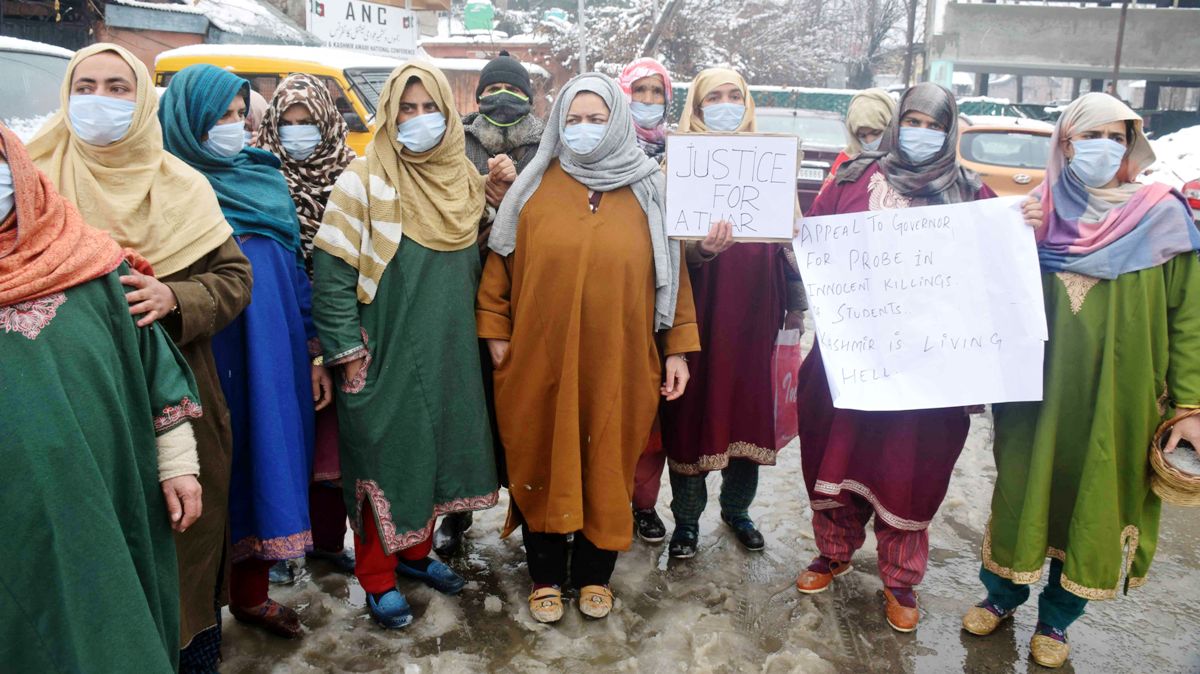
By the 2020 year-end, the issue was brought live by two persons – Mehbooba Mufti, the former Chief Minister of Jammu and Kashmir, and Kashmir Police Chief, Vijay Kumar.
“Article 17 of the 1949 Geneva Convention I provides that [parties to the conflict] shall further ensure that the dead are honourably interred, if possible according to the rites of the religion to which they belonged, that their graves are respected, grouped if possible according to the nationality of the deceased, properly maintained and marked so that they may always be found,” he read out from the book.










